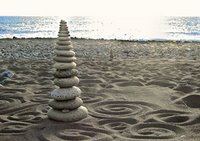
I've been dreading this day, just like I've been dreading this vacation, in spite of looking forward to it so much. I cannot even say what exactly it was that I dreaded so — it had to do with my mom and my recent thoughts and emotions, my recent struggle with the way she deals with our past, things concerning my childhood. A vague unease, nothing I could name or describe, and yet it was there, a certain fear, a tension that grew bigger and bigger right before we left for this holiday. Another issue that had me worried was her husband's drinking — his denial of his alcoholism as much as her habit to bring it up, their quarreling and argueing about it in my presence. And what I feared even more is his tendency to verbally attack her and pick on her in front of others. I've been going through all that so often and I'm just tired of it ... unnerved and disgusted.
Anyway, maybe I worried for no reason — things are going smoothly so far and these past four days have been pretty much okay. He DID drink too much yesterday night, having a hard time trying to articulate himself, and she DID start to become cynical and somewhat smug towards him, but I decided to just stay out of it as it's none of my business after all. I was hoping they wouldn't force me to take sides or to comment on anything that was being said, and gratefully, they didn't.
The days out are much easier than the nights at home — we're outside all day, walking and hiking, exploring the mountains and hillsides around here. Both of them are so much more approachable then and we actually had quite a few good conversations, even concerning the past, childhood issues, some of the stuff that has been troubling me lately, trying to come to terms with my mother's part in it.
We went for a long walk today, having lunch in a nearby village, and somehow the subject of my former stepfather's (not her present husband's) drinking and violence came up — it wasn't even me bringing it up, it somehow came about “naturally” in the course of a conversation — and I decided to just go for it and mention some of my recent thoughts. I was careful not to sound like I was accusing her of anything, I didn't want to sound reproachful in any way or cause some drama there during the meal, but at the same time I couldn't let that chance pass me by, the chance to finally express some of my feelings concerning this subject — and surprisingly enough, she was rather open for what I said. We talked about a few things, the way I experienced them as a child and why she wasn't aware of it at the time, and it felt good to bring it out into the open. It wasn't like we went into any of the details of what happened back then, but even this rather general exchange brought about some relief, and not only on my side, I think. On our way back home through the snow the atmosphere was more relaxed, it just felt different, everybody a bit more at ease with each other maybe.
We spend the afternoon lazing around and then it was time to drive over to the restaurant where we had planned on having dinner this Christmas Eve. What can I say — it was nice and harmonious. The food was excellent and so was the atmosphere. Not exactly heart-warming but relaxed anyway, which was way more than what I had expected. I didn't waste a single thought on my recent fears and misgivings, we were just chatting amicably and when it was time to leave we all felt we had spent a lovely night out together. Not too festive but rather cheerful, which was fine with me, for sure.
Back at the place where we're staying we gave our gifts to each other, which was nice as well, another surprise after a few years of this turning into a bit of a farce and disappointment. Our gifts were small but well considered, not just a shallow exchange of material items. For once, after years and years of feeling the opposite, I DID manage to feel comfortable in my mother's company at this time of year and I'm grateful for that.
The night turned out good, really — quiet, amicable, simple but harmonious — more than I had ever dared to hope for.
One day at a time, yes — I'm really trying to approach things and situations that way now, it's all that makes sense after all. So I do not plan or speculate or worry about anything besides the next moment, the next 24 hours, being grateful for what I find, joyfully present, happy and content at this very moment, and it's all that counts.
This may sound like nothing much to anybody outside, but to me it means a great deal. So thank you for that — whoever, wherever — but thank you, so much.



